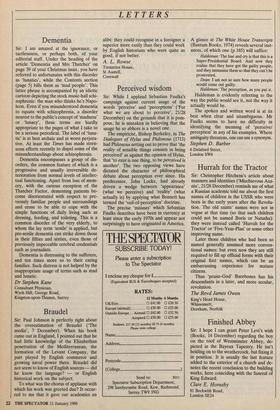LETTERS Dementia
Sir: I am amazed at the ignorance, or tactlessness, or perhaps both, of your editorial staff. Under the heading of the article 'Dementia and Mrs Thatcher' on page 39 of your Christmas issue, you have referred to unfortunates with this disorder as 'lunatics', while the Contents section (page 5) bills them as 'mad people'. This latter phrase is accompanied by an idiotic cartoon depicting the stock music-hall schi- zophrenic: the man who thinks he's Napo- leon. Even if you misunderstood dementia to equate with schizophrenia, a disorder nearest to the public's concept of 'madness' or 'lunacy', these terms are hardly appropriate to the pages of what I take to be a serious periodical. The label of 'luna- tic' is at best archaic and at worst perjora- tive. At least the Times has made stren- uous efforts recently to dispel some of the misunderstandings about schizophrenia.
Dementia encompasses a group of dis- orders, the common feature of which is a progressive and usually irreversible de- terioration from normal levels of intellec- tual functioning. Apart from loss of mem- ory, with the curious exception of the Thatcher Factor, dementing patients be- come disorientated with respect to pre- viously familiar people and surroundings and cease to be able to cope with the simple functions of daily living such as dressing, feeding, and toileting. This is a common disorder of the very elderly, to whom the lay term 'senile' is applied, but pre-senile dementia can strike down those in their fifties and sixties, even those of previously impeccable cerebral credentials such as journalists.
Dementia is distressing to the sufferers, and ten times more so to their caring families. Such distress is not helped by the inappropriate usage of terms such as mad and lunatic.
Dr Stephen Kane
Consultant Physician, Wych Hill, George Road, Kingston-upon-Thames, Surrey


























































 Previous page
Previous page